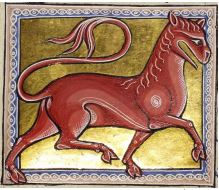The Chronicle of Eusebius of Cesarea and the Translation (and continuation) of Saint Jerome
Article Sidebar

Main Article Content
At first, the apologetic intention of inserting chronological studies in the works of authors of Greek and Jewish antiquity was clear, since the assessment of their claims depended largely on their antiquity. With the triumph of Christianity over paganism, chronologies end up emancipating themselves from other treatises, no longer apologetic (less necessary), but even historiographical in nature, until they become autonomous works that confirm the fullness of historical time with the coming of Christ to the world. In this paper we analyze the literary antecedents of the chronologies prior to Eusebius of Cesarea, the characteristics that his Chronicle might have, and the peculiarities of the translation and extension of Saint Jerome, who launched this historiographic subgenre up to the Middle Ages and beyond.
Article Details
ADLER, W., Tuffin, P. The Cronography of George Synkellos. A Byzantine Chronicle of Universal History from the Creation. Oxford: Oxford University Press, 2002.
BROWN, P. Through the Eye of a Needle. Princeton: Princeton University Press, 2014.
BURGESS, R. W., KULIKOWSKI, M. Mosaics of time. Turnhout: Brepols, 2013.
CARRIKER, A. J. The library of Eusebius of Caesarea. Leiden-Boston: Brill, 2003.
CERESA-CASTALDO, A. Gerolamo. Gli Uomini Illustri. De viris illustribus. Bolonia: EDB, 1988.
COURCELLE, P. Les lettres grecques en Occident. Paris: E. de Boccard Éditeur, 1948.
CROKE, B. «The Origin of the Christian World Chronicle». In History and Historians in Late Antiquity, B. Croke, A. Emmett (eds.). Sidney: Pergamon, 1983, pp. 116-131.
DONALSON, M. A Translation of Jerome's Chronicon with Historical Commentary. Lewiston: Edwin
Mellen Press, 1996.
DORIVAL, G. «L'apologétique chrétienne et la culture grecque». In Les Apologistes chrétiens et la culture grecque, de B. Pouderon, & J. Dore. Paris: Beauchesne, 1998, pp. 423-466.
EDER, W., RENGER, J. Herrscherchronologien der antiken Welt. Stuttgart: Verlag J. B. Metzler, 2004.
FINEGAN, J. Handbook of Biblical Chronology: Principles of Time Reckoning in the Ancient World and Problems of Chronology in the Bible. Peabody, Massachusetts: Hendrickson Publishers, 1998.
GAMBERALE, L. San Gerolamo, intellettuale e filologo. Roma: Edizioni di Storia e Letteratura, 2013.
GRABBE, L. «Chronography in Hellenistic Jewish Historiography». In En Seminar Papers, II. Society of Biblical Literature, 17, 1979, P. J. (ed.). Achtemeier. Missoula, Massachusets: Society of Biblical Literature, 1979, pp. 43-68.
GRAFTON, A., WILLIAMS, M. Christianity and the Transformation of the Book. Cambridge,
Massachusetts: Harvard University Press, 2006.
GRANT, R. M. Greek Apologists of the Second Century. London: SCM Press, 1988.
HELM, R. Die Chronik des Hieronymus. Eusebius Werke VII. Leipzig: Akademie Verlag, 1956.
HOLLADAY, C. R. Fragments from Hellenistic Jewish Authors I, Historians. Chicago: Society of Biblical Literature Texts and Translations, 1983.
IMPELLIZZERI, S. «S. Basilio e l'Ellenismo.» Basilio de Cesarea. La sua etá, la sua opera e il basilianismo in Sicilia. Atti del Congresso Internazionale, vol II. Messina: Università di Messina. Facoltá de Lettere e Filosofia. Centro di Studi Umanistici., 1983, pp. 959-977.
INGLEBERT, H. Interpretatio Christiana: les muations de savoirs, cosmographie, géographie, ethnographie, histoire, dans l'antiquité chrétienne, 30-630 après J.-C. Paris: Brepols, 2001.
JEANJEAN, B., LANÇON, B. Saint Jérôme, Chronique. Continuation de la Chronique d'Eusèbe. Rennes: Presses Universitaires de Rennes, 2004.
KELLY, J. N. D. Jerome: His Life, Writings and Controversies. London: Duckworth and Co., 1975.
KOFSKY, A. Eusebius of Caesarea against Paganism. Boston-Leiden: Brill, 2002.
MARCOS CELESTINO, M., MARCOS CASQUERO, M.-A. San Jerónimo. Comentario al profeta Jeremías. Obras completas VII. Madrid: BAC, 2008.
MARTÍN, J. P. Teófilo de Antioquía. A Autólico. Madrid: Ciudad Nueva, 2004.
MOMIGLIANO, A. La sabiduría de los bárbaros. México: Fondo de Cultura Económica, 1999.
MORESCHINI, C. Storia del pensiero cristiano tardo-antico. Firenze: Bompiani, 2019.
MOSSHAMMER, A. The Chronicle of Eusebius and Greek Chronographic Traditions. London: Associated University Presses, 1979.
OROZ RETA, J., MARCOS CASQUERO, M. A. San Isidoro de Sevilla. Etimologías. Madrid: BAC, 2009.
POUDERON, B. Les Apologistes grecs du II siècle. Paris: Cerf, 2005.
ROSENBERG, D., Grafton, A. Cartographies of Time. A History of Timeline. New York: Princeton
Architecturan Press, 2009.
SCHÖNE, A. Die Weltchronik des Eusebius in ihrer Bearbeitung durch Hieronimus. Berlin: Weidmannsche Buchhandlung, 1900.
SIRINELLI, J. Les vues historiques d'Eusèbe de Césarée durant la période prénicéenne. Dakar: Université de Dakar. Publications de la section de langues et littératures, 1961.
VALERO, J. B. San Jerónimo. Epistolario I. Madrid: BAC, 1993.
VIAN, G. M. Filología e historia de los textos cristianos. Madrid: Cristiandad, 2005.
WALLRAFF, M. Iulius Africanus Chronographiae. Berlin-New York: De Gruyter, 2007.
WILLIAMS, M. H. The Monk and the Book. Chicago: The University of Chicago Press, 2006.
YOUNG, F. «Greek Apologists of the Second Century». In. Apologetics in the Roman Empire, de M.
Edwards, M. Goodman, S. Price, & Ch. Rowland. Oxford: Oxford University Press, 1999, pp.
81-104.
ZUMTHOR, P. La medida del mundo. Madrid: Cátedra, 1994.